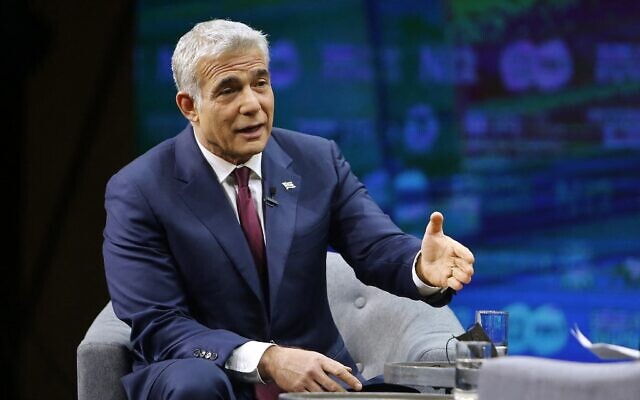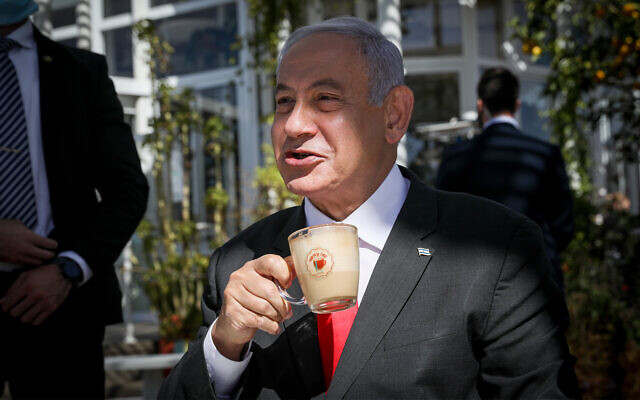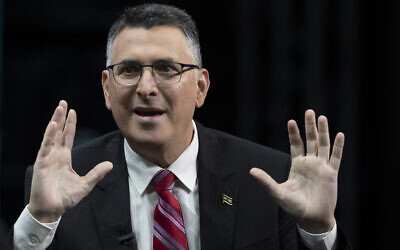PM says opposition leader must first declare he’s running for premiership; Sa’ar says he and Bennett must be allowed to take part too

Opposition leader Yair Lapid made a last-minute call Saturday for Prime Minister Benjamin Netanyahu to engage in a televised debate with him in the evening, three days before the country goes to the polls.
According to Kan news, Lapid contacted all three major networks — Kan, Channel 12 and Channel 13 — and said he was willing to hold a jointly broadcast debate. Channels 12 and 13 both said Netanyahu was holding discussions with allies and had not yet decided on a response.
Later Saturday, Netanyahu appeared to dodge the challenge, saying in a TV interview that he would agree to debate Lapid if the latter formally declares he’s running for prime minister.
“Why doesn’t he say, ‘I want to debate because I’m running against you for the premiership”’? Netanyahu asked Saturday evening on Channel 12’s “Meet the Press” which aired interviews with almost all the leaders of the political parties running in the upcoming election.
Lapid had declined to appear on the show on Saturday.
“Our country is not a game for ambitious politicians,” Netanyahu said. The public needs to understand Lapid’s intentions, he added.
“The Israeli public deserves a debate,” Lapid had said earlier in a statement. “They deserve answers. They need to know what sort of government you plan to create here.”
Lapid said Netanyahu seeks to build “a backwards, racist, extortionist government” with a strong right-wing-religious slant that “will push away an entire generation and bury Israeli democracy.
“The studios are ready, the interviewers are ready, two podiums are ready. For long months you’ve put me on placards, made speeches against me, made clips against me. Let’s see if you meant it. Let’s see if you really want a debate or if you run away.
“Come to a debate Bibi…You said I’m your opponent, come to a debate. You asked ‘Where’s Lapid?’ Here I am.”
In response to Lapid’s challenge, New Hope party leader Gideon Sa’ar said any debate should include himself and Yamina party leader Naftali Bennett, since both are declared candidates for prime minister.
“If need be, New Hope will appeal to the Central Elections Committee to enforce this,” the party said in a statement.
Netanyahu had himself said Tuesday that he would agree to a pre-election political debate with Lapid, if the two could agree on a moderator. Lapid had remained silent on the matter until Saturday.

Netanyahu said in an interview at a conference organized by right-wing Channel 20 on Tuesday: “I’m ready to tell him very simply, ‘Come now, let’s agree on a moderator and let’s debate.’”
He suggested that journalist Erel Segal, who was conducting the interview, be the moderator.
Pre-election debates by prime ministerial candidates were once a regular occurrence in Israel but have not taken place in decades. Netanyahu has refused repeated calls to debate his rivals ahead of elections.

Lapid and Netanyahu have both been dancing around the debate issue for some time. Last week Lapid challenged the premier to a debate in an interview with Channel 12 News.
“I am interested in a debate with Netanyahu,” he said, adding that it is “more important that Netanyahu ends his term than I become prime minister.”
Netanyahu responded that he would debate Lapid if the Yesh Atid leader acknowledged he was running for prime minister.
Israelis go to the polls on March 23 for the fourth time in two years.
Also Saturday, New Hope candidate Yifat Shasha-Biton said Netanyahu “lies without blinking and warned he was “setting Israel on the path to one-man rule.”
Speaking at a cultural-political event in Holon, Shasha-Biton said Netanyahu “does what he wants, plays with peoples lives, their livelihoods, their health, our children’s education. Everything with him is derived from personal and cynical considerations and it is in our power to stop it.”
The latest polls have shown Netanyahu with momentum on the final stretch of the election campaign, rising from some 28 seats to 30-32 and on the cusp of a threadbare majority.
Lapid’s Yesh Atid party is forecast to be the second-largest party in the 120-seat Knesset, with around 18-20 seats.
Netanyahu has been seeking for weeks to portray the elections as being between him and Lapid, in an attempt to minimize the threat posed by fellow right-wingers Gideon Sa’ar and Naftali Bennett, both of whom have expressed willingness to form a coalition with center-left parties that excludes the premier’s Likud party. Netanyahu has accused Sa’ar and Bennett of planning to join Lapid after the election in a “left-wing” government.
“Vote for Likud, you get Bennett as a respectable minister in my government. Vote for Bennett, you get him as a minister in Lapid’s government,” Netanyahu claimed Tuesday during a campaign event in Givat Shmuel.
Bennett has not ruled out sitting with Likud in a coalition, while Sa’ar has vowed not to partner with Netanyahu’s party. Sa’ar and Bennett have pledged to not join a coalition led by Lapid, who has refrained from declaring himself a candidate for prime minister. The left-wing Labor and Meretz parties have said they will back Lapid for the premiership.

Former Likud MK Sa’ar has also challenged Netanyahu to a debate, a challenge the premier has ignored.
New Hope, a right-wing party Sa’ar founded last year, is made up mostly of former Netanyahu allies who seek to unseat the longtime prime minister in the March 23 vote.
Ahead of the March 2020 elections, Netanyahu had also challenged his main rival at the time, Benny Gantz, to a debate, which ultimately never materialized.
Such a debate, if it were to take place, would be the first between two leading candidates for Israel’s premiership in over 24 years. The last time was in 1996 between Netanyahu and then-prime minister Shimon Peres. Netanyahu went on to win that election.
The election — the fourth in two years — was called after the power-sharing government of Likud and Blue and White failed to agree on a budget by a December 23 deadline. The election, like the previous three votes, is largely seen as a referendum on Netanyahu’s rule, given his ongoing trial on corruption charges, as well as his government’s handling of the COVID-19 pandemic.
As reported by The Times of Israel
